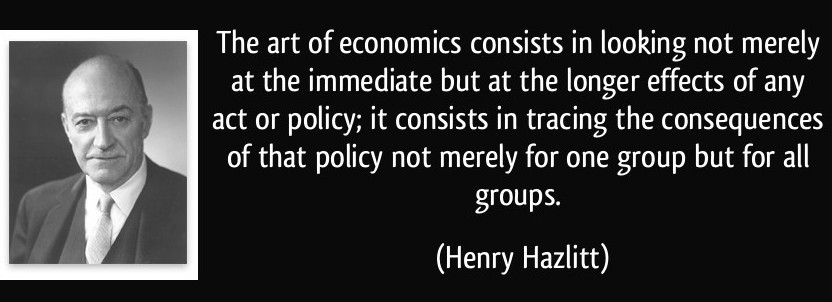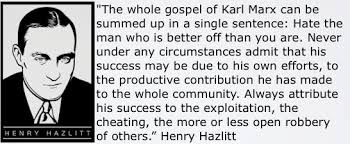|
Word Gems
exploring self-realization, sacred personhood, and full humanity
Henry Hazlitt
Economics In One Lesson
Savings
return to previous page

... today the ancient virtue of thrift, as well as its defense by the classical economists, is once more under attack, for allegedly new reasons, while the opposite doctrine of spending is in fashion.
In order to make the fundamental issue as clear as possible, we cannot do better, I think, than to start with the classic example used by Bastiat.
Let us imagine two brothers, then, one a spendthrift and the other a prudent man, each of whom has inherited a sum to yield him an income of $50,000 a year. We shall disregard the income tax, and the question whether both brothers really ought to work for a living or give most of their income to charity, because such questions are irrelevant to our present purpose.
-
Alvin, then, the first brother, is a lavish spender. He spends not only by temperament, but on principle. He is a disciple (to go no further back) of Rodbertus, who declared in the middle of the nineteenth century that capitalists "must expend their income to the last penny in comforts and luxuries," for if they "determine to save . . . goods accumulate, and part of the workmen will have no work."
Alvin is always seen at the night clubs; he tips handsomely; he maintains a pretentious establishment, with plenty of servants; he has a couple of chauffeurs, and doesn't stint himself in the number of cars he owns; he keeps a racing stable; he runs a yacht; he travels; he loads his wife down with diamond bracelets and fur coats; he gives expensive and useless presents to his friends.
To do all this he has to dig into his capital. But what of it? If saving is a sin, dissaving must be a virtue; and in any case he is simply making up for the harm being done by the saving of his pinchpenny brother Benjamin.
It need hardly be said that Alvin is a great favorite with the hat check girls, the waiters, the restaurateurs, the furriers, the jewelers, the luxury establishments of all kinds. They regard him as a public benefactor. Certainly it is obvious to everyone that he is giving employment and spreading his money around.
Compared with him brother Benjamin is much less popular. He is seldom seen at the jewelers, the furriers or the night clubs, and he does not call the head waiters by their first names. Whereas Alvin spends not only the full $50,000 income each year but is digging into capital besides, Benjamin lives much more modestly and spends only about $25,000.
Obviously, think the people who see only what hits them in the eye, he is providing less than half as much employment as Alvin, and the other $25,000 is as useless as if it did not exist.
But let us see what Benjamin actually does with this other $25,000. He does not let it pile up in his pocketbook, his bureau drawers, or in his safe. He either deposits it in a bank or he invests it. If he puts it either into a commercial or a savings bank, the bank either lends it to going businesses on short term for working capital, or uses it to buy securities.
Any one of these projects puts as much money into circulation and gives as much employment as the same amount of money spent directly on consumption.
-
"Saving," in short, in the modern world, is only another form of spending. The usual difference is that the money is turned over to someone else to spend on means to increase production.
So far as giving employment is concerned, Benjamin's "saving" and spending combined give as much as Alvin's spending alone, and put as much money in circulation. The chief difference is that the employment provided for Alvin's spending can be seen by anyone with one eye; but it is necessary to look a little more carefully, and to think a moment, to recognize that every dollar of Benjamin's saving gives as much employment as every dollar that Alvin throws around.
A dozen years roll by.
Alvin is broke. He is no longer seen in the night clubs and at the fashionable shops; and those whom he formerly patronized, when they speak of him, refer to him as something of a fool. He writes begging letters to Benjamin. And Benjamin, who continues about the same ratio of spending to saving, not only provides more jobs than ever, because his income, through investment, has grown, but through his investment he has helped to provide better-paying and more productive jobs. His capital wealth is greater also. Because of his investments, the national wealth and income are greater. He has, in brief, added to the nation's productive capacity; Alvin has not.
So many fallacies have grown up about saving in recent years that they cannot all be answered by our example of the two brothers. It is necessary to devote some further space to them. Many stem from confusions so elementary as to seem incredible, particularly when found in economic writers of wide repute. The word "saving," for example, is used sometimes to mean mere hoarding of money, and sometimes to mean investment, with no clear distinction, consistently maintained, between the two uses.
Mere hoarding of hand-to-hand money, if it takes place irrationally, causelessly, and on a large scale, is in most economic situations harmful. But this sort of hoarding is extremely rare. Something that looks like this, but should be carefully distinguished from it, often occurs after a downturn in business has got under way. Consumptive spending and investment are then both contracted. Consumers reduce their buying. They do this partly, indeed, because they fear they may lose their jobs, and they wish to conserve their resources: they have contracted their buying not because they wish to consume less but because they wish to make sure that their power to consume will be extended over a longer period if they do lose their jobs.
But consumers reduce their buying for another reason. Prices of goods have probably fallen, and they fear a further fall. If they defer spending, they believe they will get more for their money. They do not wish to have their resources in goods that are falling in value, but in money which they expect (relatively) to rise in value.
The same expectation prevents them from investing. They have lost their confidence in the profitability of business; or at least they believe that if they wait a few months they can buy stocks or bonds cheaper. We may think of them either as refusing to hold goods that may fall in value on their hands, or as holding money itself for a rise.
It is a misnomer to call this temporary refusal to buy "saving." It does not spring from the same motives as normal saving. And it is a still more serious error to say that this sort of "saving" is the cause of depressions. It is, on the contrary, the consequence of depressions.
It is true that this refusal to buy may intensify and prolong a depression once begun. But it does not itself originate the depression. At times when there is capricious government intervention in business, and when business does not know what the government is going to do next, uncertainty is created. Profits are not reinvested. Firms and individuals allow cash balances to accumulate in their banks. They keep larger reserves against contingencies.
This hoarding of cash may seem like the cause of a subsequent slowdown in business activity.
The larger cash balances of firms and individuals are merely one link in the chain of consequences from that uncertainty. To blame "excessive saving" for the business decline would be like blaming a fall in the price of apples not on a bumper crop but on the people who refuse to pay more for apples...
-
-
-
-

|

